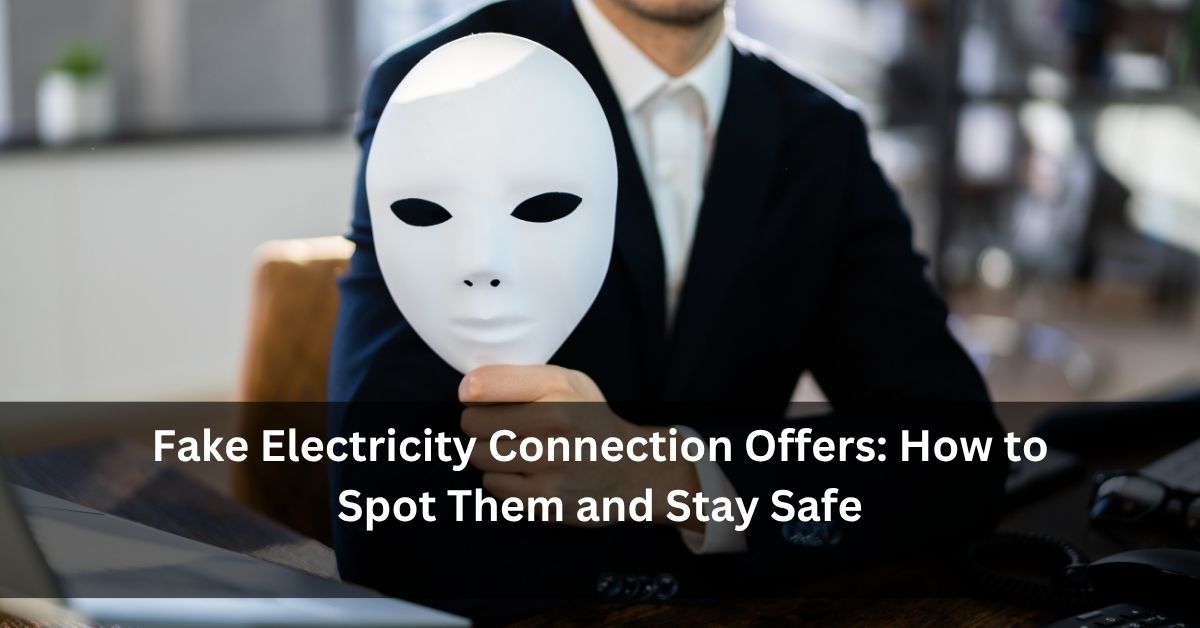Fake Electricity Connection Offers: How to Spot Them and Stay Safe
Electricity is something we all use every day. Whether it’s for lighting our homes, using fans, charging phones, or running kitchen appliances—it’s a basic need. Because of this, scammers have started using electricity as a way to cheat people. They send fake messages and make phone calls that sound serious. Many people, in a hurry or out of fear, end up losing their money.
This article explains how these scams work, what warning signs you should look for, and how to report them using Portal Chakshu, a platform started by the government to help people report fraud.
How These Fake Electricity Scams Happen?
Here are the most common ways scammers are fooling people across India:
1. Disconnection Warning Messages
You get a message like this:
“Dear customer, your electricity will be disconnected today at 10:30 PM. Please call 98XXXXXXX to avoid disconnection.”
These messages create panic. The phone number looks like a regular mobile number. When you call, the person on the other end acts like an official. They ask you to make a payment or download an app. Once you do this, they can either steal money from your account or gain access to your phone.
2. Fake Bill Payment Links
Another method is sending a link via SMS or WhatsApp saying:
“Pay your pending electricity bill here: www.fake-electric-bill.com”
These links look real but are made by scammers. Once you click and enter your bank or card details, the money is stolen. Some links also ask for Aadhaar, PAN, or OTP. All of this can be misused.
3. Calls for Fast New Connections
Sometimes, you may get a call offering a quick electricity connection in your name or for a rented house. They will ask for an advance payment, and after that, they disappear.
Real Incidents That Show the Danger
These scams are not just small-time tricks. Real people have lost lakhs of rupees due to these messages and calls:
- In Delhi, a man clicked on a link claiming to be from his power company. He lost ₹6 lakh because the link was fake and captured his bank details.
- In Hyderabad, people received SMS messages saying their electricity would be disconnected. When they called, scammers asked for small payments and then accessed their phones through fake apps.
- In West Delhi, a man was tricked by a caller claiming to be from the power department. He installed an app that gave the scammer remote control of his mobile. He lost ₹9 lakh within minutes.
These stories show how important it is to stay alert and take quick action.
How to Know If a Message or Call Is Fake?
Here are simple things to check:
- Check the sender’s number: Official companies do not use personal mobile numbers to send messages. If the number is not from your state electricity board, be careful.
- Urgency in the message: If the message says things like “Act now” or “Your connection will be cut in 30 minutes,” it’s likely a scam.
- Spelling mistakes: Fake messages often have small spelling or grammar errors.
- Fake websites: Real power company websites are easy to find on Google. If the link looks odd or different, do not click it.
- Asking for personal details: No official will ask for your bank password, OTP, or Aadhaar on the phone.
What You Should Do If You Get Such a Message
If you receive a suspicious message, don’t panic. Follow these steps:
- Do not call or reply to the message directly.
- Take a screenshot or note down the mobile number and message content.
- Do not click on any links or download apps from unknown senders.
- Visit Portal Chakshu and file a report. This will help the government track and block the scammer’s number.
- Contact your electricity company directly through their official number and confirm if there is any issue with your connection.
How to Report a Fake Message on Portal Chakshu
Portal Chakshu is made by the Department of Telecommunications. It allows you to report any suspicious call, SMS, or message from WhatsApp.
Here’s how to use it:
- Go to Portal Chakshu
- Click on “Report Suspected Fraud Communication”
- Enter the details like the phone number, type of message, and time
- Upload screenshots if possible
- Submit your report using mobile number OTP
Your report helps block that number and prevent more people from being cheated.
Safety Tips for Everyone
- Never share personal details like OTPs, PINs, or bank information over phone or SMS.
- Only pay electricity bills through official websites or apps like Paytm, Google Pay (verified), or your power board’s own portal.
- Educate your family members, especially senior citizens, about such scams.
- Install security apps that give alerts about fraud links or fake websites.
- Report every suspicious message on Portal Chakshu even if you didn’t lose money. It helps others.
Final Words
Fake electricity connection scams are spreading fast. People are being fooled by urgent messages, fake links, and calls that sound official. But with a little care, you can avoid these scams easily.
Always stop and think before clicking on any link or calling back an unknown number. Use Portal Chakshu to report such frauds quickly. This small step can protect not just you, but also your neighbours, friends, and family.
Stay aware, stay safe, and let’s stop fraud together.






